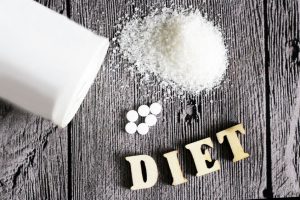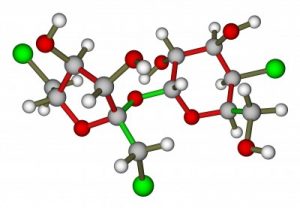
Neotame®. Just another diet sweetener, but why is it so stealth?
It’s a modified version of aspartame and it’s in foods and drinks without a required label.
In October 2002, the FDA approved Neotame, and this chemical sweetener may prove more troublesome than aspartame because it can be inserted unlabeled, and it is suspected of causing similar health problems, including learning and behavioral problems, with more potency.
Neotame has been passed from Monsanto Chemical Company (original patent holder) to The NutraSweet Company to J.W. Childs Partnership to Pharmacia to Pfizer.
Aspartame + More

Neotame contains all the dangerous elements of aspartame + more: it is made from the two original amino acids found in aspartame – L-aspartic acid and L-phenylalanine, and now with two organic functional groups: one, a methyl ester group (methanol original to aspartame) and the other a neohexyl group. Joined together, these components form sweetness 13,000 times sweeter than sugar, equaling 8,000 teaspoons of sugar.
Like aspartame, it is a very potent and dangerous compound.
First petitioned for FDA approval in 1997, Neotame was finally approved in 2002 as safe for:
- chewing gum,
- carbonated soft drinks,
- refrigerated and non-refrigerated ready-to-drink beverages,
- frozen desserts and novelties,
- puddings and fillings,
- yogurt products,
- baked goods,
- candies.

Say No To Isolated Amino Acids
Phenylalanine and aspartic acid are the two amino acids found in aspartame and Neotame. They are essential amino acids found naturally in many foods, but there is a big difference between natural amino acids found in combination and man-made laboratory replicas split into isolated forms.
Amino acids enter into your brain, so food and pharmaceutical manufacturers love to piggy-back their manmade chemicals onto amino acids because the amino acid will carry their chemicals into the brain.
This can be dangerous because it is unnatural and can cause many adverse health reactions.
Phenylalanine and aspartic acid help our neurotransmitters to function normally, but our bodies are designed to handle “normal” amounts of these amino acids.
Nevertheless, when we take in large amounts of them, the delicate balance in our bodies is disrupted and they become toxic to the nervous system. Both phenylalanine and aspartic acid interfere with the production of serotonin, a neurotransmitter that drives many important functions in a healthy body, such as helping us to concentrate and learn.
Serotonin is also a calming agent, and a person deficient in serotonin is prone to behave violently, have mood swings and phobias, and become depressed and suicidal.
Aspartame and Neotame are made of 50% phenylalanine (far too much), 40% aspartic acid, and 10% methanol; Neotame has the extra added ingredient to make it even sweeter.
Neotame appears to have the “next generation“of aspartame problems plagueing people today. Yet, this aspartame issue now continues 13,000 times more dangerously.
No Labels

Since the FDA passed the ruling that Neotame does not have to be labeled in the products they are in, how do you know if you’re getting into it?
As a general Rule of Thumb, it shouldn’t be in regular food products that are NOT sugar-free.
To avoid exposure to this toxic sweetener, avoid all sugar-free and fat-free products.
That’s really the only way to avoid Neotame.
_____________
Join my Private Membership Program
Gain access to all of my online programs, ongoing support, monthly Q&A, and more by joining my Private Inner Circle Membership Program. I look forward to supporting you on your journey to alternative health and wellness.
_____________
Disclaimer: This article is for informational purposes only, and is educational in nature. The FDA may not have evaluated some of the statements. This article is not intended to diagnose, treat, cure, or prevent any disease. Please discuss with your own, qualified health care provider before adding supplements or making any changes to your dietary program.
Before taking vitamins, consult your doctor; pre-existing medical conditions or medications you are taking can affect how your body responds to multivitamins.